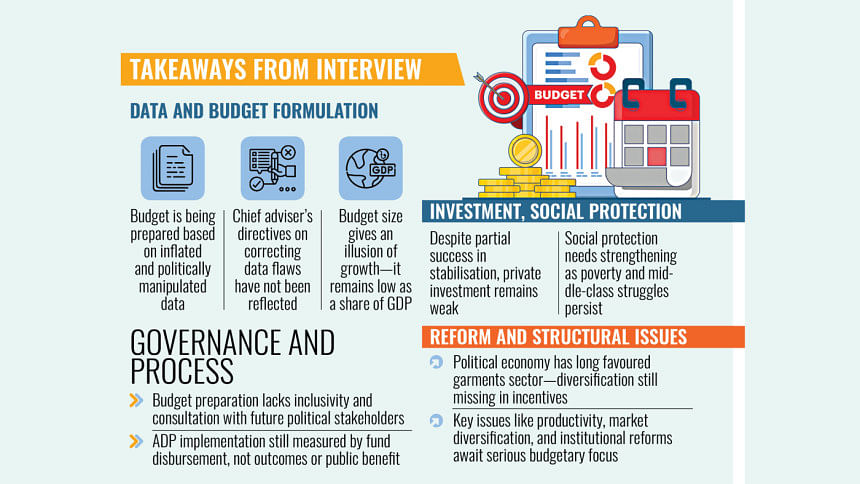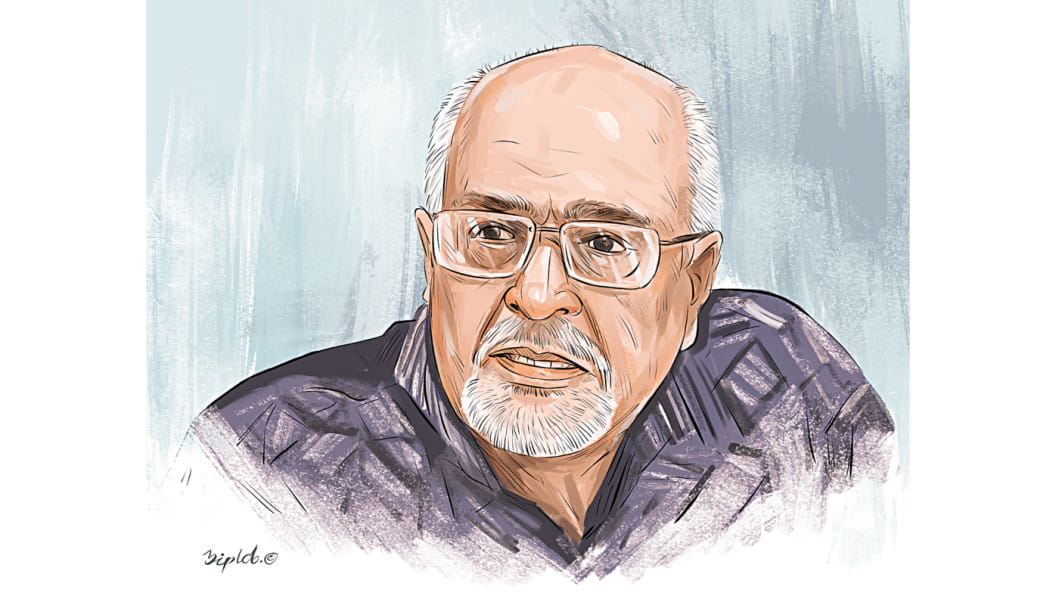Budget being built on inflated data

The interim government is preparing the national budget for fiscal year (FY) 2025–26 using inflated growth figures published by the previous government to create a misleading narrative of development, said economist Debapriya Bhattacharya.
"In the White Paper on the State of the Bangladesh Economy, we have clearly shown how the base of the Awami League government's data was the main villain behind its narrative of development—because it presented an exaggerated, undivided picture of development," said Bhattacharya, a macroeconomist and public policy analyst.
Bhattacharya led the team that prepared the white paper after the interim government took office.
He said the Chief Adviser of the interim government, Muhammad Yunus, drew on the white paper's findings and recommendations in his address to the nation on December 16 last year.
"One major issue the Chief Adviser emphasised was the exaggeration in official data and how it misled the public, policymakers, and foreign stakeholders," said Bhattacharya, a distinguished fellow at the local think tank Centre for Policy Dialogue (CPD).
"Unfortunately, it has now been nearly nine months since this government assumed office, yet no meaningful or reform-oriented steps have been taken to correct the problem," added the economist.

A recently formed government committee on data has a limited mandate, he said, as the committee's main focus is on assessing data quality, without identifying the deeper methodological flaws caused by political interference.
Moreover, the committee's report is expected to be submitted after the budget. "This means the upcoming budget is still being built on the same flawed economic data," Bhattacharya commented.
In that sense, the economist said the directives given by the Chief Adviser in his speech were not followed when reassessing the budget data.
Calling the budgetary context "unprecedented," he said the current administration came to power through a student-led mass uprising. "Yet, it is proceeding with only minor revisions to the previous government's budget." "No new budget has been drawn up. Nor has there been a new Annual Development Programme [ADP]," he said.
"There is no certainty this government will be in a position to implement the next budget in full," said the CPD distinguished fellow. "So, they are partially executing the previous government's budget and preparing the next one for a future government. In that sense, this is historically unique."
One of the core responsibilities of the interim government, he said, was to identify the economy's structural weaknesses—something the white paper sought to highlight.
"But even more urgent was the task of stabilising the economy, particularly by tackling inflation, the depreciation of the taka, and spiralling interest rates. The government may have had partial success in this regard."
According to him, reform—especially in the banking and energy sectors—was another key duty. While a few initiatives have been taken, Bhattacharya said further steps are needed in the coming fiscal year for macro stability.
"What is crucial now is to strengthen the stabilisation programme so macroeconomic stability can be sustained. And this stability must translate into growth," he added.
The current problem, however, is that private sector investment remains stagnant. Although opening letters of credit (LCs) is easier than before, imports—especially of capital goods—are on the decline, according to the economist.
"Investors say there is a liquidity crunch in banks. Yet, they are not borrowing much. Energy supply issues persist, and labour wage problems remain unresolved," Bhattacharya said.
He added that raising investment, generating employment, and increasing exports and remittances are pressing concerns. "Social protection must also be strengthened. The number of poor people has risen, and the lives of the middle and lower-middle classes have not improved."
Commenting on the size of the national budget, Bhattacharya said he has never thought that the budget is growing in size—because the size of the budget should not be evaluated in monetary terms; it should be considered as a share of gross domestic product (GDP).
In that context, he said, the budget has shrunk in recent years. "That is why I have called it a kind of fiscal illusion. The figure might seem large in absolute terms, but as a share of the economy, it remains low."
Expenditure has never crossed 14–15 percent of GDP, and this year it will likely fall even further. "Since the GDP is overstated, the government cannot increase the budget's share of the economy. In this way, they will be caught in their own trap."
On implementation, Bhattacharya said the government measures success by the disbursement of funds, not by outcomes. "Implementation through bureaucrats or project directors is outdated and inefficient. It neither ensures effective use of funds nor delivers political credit."
Empowering local governments and holding them accountable through democratic means would yield better results, he suggested. "I hope to see signs of this change in the budget."
Bhattacharya also talked about the government's limited political footing.
"This is not an elected government. It is a legitimate government that emerged from a public uprising and holds a certain mandate, but that mandate is also limited in many ways."
Even more troubling, he said, is the absence of a political party backing the administration. "It has no political base to guide it or hold it accountable. That is why we expected the budget to be prepared through wide consultations."
"It is unfortunate that there has been little effort to create accountability or ensure transparency."
"An even bigger regret is that this government will not implement the entire budget. So, they should have engaged with potential future political representatives. But whether they have done so, I cannot say," commented the economist.
He said that while several discussions have taken place with political parties regarding reforms, there has been no consultation on the national budget. "That seems very strange to me."
Regarding Bangladesh's graduation from the least developed country (LDC) club in December 2026, Bhattacharya said this budget must lay the groundwork for the transition.
"A key part of that transition is economic diversification. The country must reduce its dependence on the readymade garment sector. The same goes for export markets and even agriculture."
He called for a renewed focus on productivity. "What we produce in ten days, Vietnam produces in three. Without higher productivity, we would not be competitive. And if labour productivity does not rise, neither will wages."
He also elaborated on institutional reform. "We need better trade support systems, lower costs of doing business, a functioning banking sector and capital market, and operational ports. We must also invest in skilled human resources."
On sectoral incentives, Bhattacharya was critical of the political economy underpinning industrial policy. "The readymade garment sector has received disproportionate benefits. In the last parliament, over 80 of the 300 members of the house came from this one industry. That shows its political and economic clout."
"In contrast, what did small, micro, and medium entrepreneurs receive?" he asked.
"Therefore, the political economy we had was against diversification, and this needs to be balanced in a coordinated way. Was that discussion held around this budget? That is my question," Bhattacharya said.
He said the upcoming budget would be a test. "We will see whether it addresses these issues—especially which sectors receive concessions and new incentives."
"Did sectors besides readymade garments, such as IT, ceramics, and leather, receive anything? What about jute? Rural industries? We will be watching closely to see whether the incentive package is more equitable than before," he concluded.

 For all latest news, follow The Daily Star's Google News channel.
For all latest news, follow The Daily Star's Google News channel. 







Comments